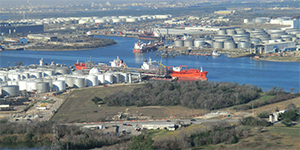Dozens of ships have experienced fuel system problems after using bunkering fuel from Houston-area suppliers, and at least one company believes the contamination stems from issues at one or more refineries.
Veritas Petroleum Services (VPS) issued a report in late May indicating IFO 380 bunker from affected ships contained abnormal compounds normally found in adhesives. In these samples, lab tests found a substance called 4-Cumylphenol in fuel taken from affected ships at levels ranging from 300 to 1,000 parts per million.
“VPS has identified that phenolic contamination of fuel oils gives rise to problems with fuel injection equipment and filter clogging,” the company said in a May 30 news release. “It is therefore our conclusion that the presence of phenolic compounds are most likely the cause of problems arising from this batch of problem fuel delivered in Houston and surrounding ports.”
The U.S. Coast Guard said the problem has affected multiple fuel suppliers in the Gulf region and likely stems from additives to bunker fuel.
“No definitive source has been identified but it’s presumed to be associated with the use of fuel oil cutter stocks,” the Coast Guard said in a June 8 safety alert. “Cutter stocks are generally lighter petroleum products that are added to heavy fuel to reduce its viscosity.”
VPS, which has an office near Houston and others around the world, first described the fuel contamination problem in a bunker alert to its customers in April. According to the company, ships that took fuel in Houston reported myriad fuel system problems that included fuel pump failures and sticking plungers.
During the next month, the company said more than 30 client ships were affected by contaminated fuel, “making it one of the most widespread fuel quality issues of recent years.” VPS said there were at least eight suppliers and 17 bunker tankers in the chain of supply.
VPS took fuel samples from affected ships and conducted tests to determine the fuel’s physical properties. Scientists determined that internationally sanctioned testing methods could not identify the foreign substances in the fuel. The firm then turned to “proprietary” tests that found the phenolic compounds.
Some fatty acids also were present in the test fuel samples, although at lower levels than the 4-Cumylphenol. The phenol compound identified in the fuel has adhesive qualities and is used in multiple industries, the Coast Guard said.
According to the Coast Guard, another testing firm found similar contaminants in the fuel it tested.
Coast Guard Sector Houston-Galveston learned about the fuel contamination issue in early May. Although these substances can cause engine failures and loss of propulsion, sector spokesman Edward Wargo said no marine casualties in the sector have been attributed to bad bunker fuel.
The Coast Guard does not regulate this part of the industry, and Wargo said it has focused on raising awareness about the issue.
“However, if it is determined that a vessel has contaminated fuel on board, the Coast Guard would require that the vessel remove the contaminated fuel to mitigate any potential risks of casualty,” he said. The service also would try to identify the fuel supplier to determine if any other vessels were affected.
The Coast Guard warned that the presence of these compounds in bunker fuel violates MARPOL and ISO 8217 standards. ISO 8217 makes clear that “fuel shall not include any added substance or chemical waste which jeopardizes the safety or adversely affects the performance of the machinery, or is harmful to personnel, or contributes overall to additional air pollution.”
In its safety alert, the Coast Guard recommends that operators pay attention to terms of the bunker requisition, specify that fuels should be “absent of abnormal components,” and determine the acid number of the fuel.
VPS said in late May that it could not determine the source of the contamination. The company believes it is “a potential upstream production, or refinery issue, with the ‘true’ cause unknown at (this) time.”
Additional details on the vessels affected by the contaminated fuel could not be found by press time.
Mark Miller, a spokesman for Crowley Maritime Corp., said the company was aware of the situation and was monitoring its fleet for signs of contamination. “As a precaution,” he said, “we are sourcing our fuel from other locations until the contamination issue is resolved.”

